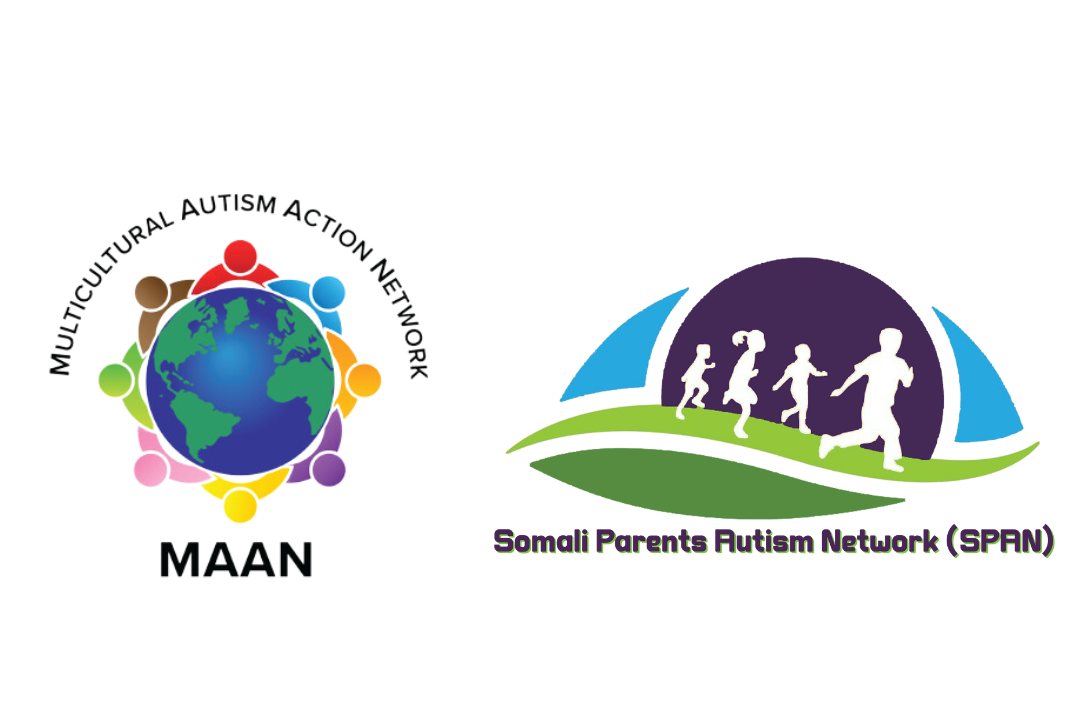AuSM Earns Grants to Help Somali and Multicultural Families Understand Autism and Access Services

Backed by two Innovations Grants from the Minnesota Department of Human Services (DHS), the Autism Society of Minnesota (AuSM) is supporting two nonprofit partners – Somali Parents Autism Network (SPAN) and Multicultural Autism Action Network (MAAN). AuSM and its nonprofit partners are helping families and individuals affected by autism overcome societal stigma and get culturally responsive services through these two grant projects:
- Somali American Community Autism Partnership, in partnership with Somali Parents Autism Network (SPAN)
- Toward Inclusion: Integrated Outcomes for People with Disabilities in Multicultural Communities, in partnership with Multicultural Autism Action Network (MAAN)
In both DHS Innovations Grant initiatives, AuSM will apply its expertise in outreach, advocacy, and education toward helping both SPAN and MAAN be more effective in serving their communities. Similarly, SPAN and MAAN can leverage their respective community relationships and cultural competencies in reaching people AuSM may not otherwise find ways to serve.
“Having seen the power of collaboration for more than 50 years in serving Minnesota’s autism community, AuSM believes our partnerships with SPAN and MAAN are win-win opportunities for all of us – especially for the previously-underserved people in communities that we can now better support with our partners,” said Ellie Wilson, AuSM’s Executive Director.
Here is a summary of both organizations, and the work AuSM will support through their respective Innovations Grants from DHS.
Somali American Community Autism Partnership
Somali Parents Autism Network (SPAN) and AuSM will apply funding from their shared DHS Innovations Grant to develop an improved service delivery for Somali immigrant families in Minnesota with children, teens, and adults diagnosed with autism by connecting them to resources and services that are cognizant of their culture.
The Somali language did not have a word for autism until recently; now, Somalis increasingly use the word “maangaar” for autism. Maangaar means “unique mind” – a term credited to Dr. Awe Jama. The coining of this phrase is an encouraging sign of growing acceptance of autism in the Somali community. AuSM supports SPAN’s vision to create a world where individuals with autism in the Somali community in Minnesota are not stigmatized and are fully embraced, understood, and empowered to reach their full potential.
“The Somali American Community Autism Partnership, aka Somali Autism Project, has the potential to transform the Somali community in Minnesota’s perception about autism as a result of this project’s public awareness campaign,” said Mahdi Warsama, SPAN’s Programs Director and Somali Autism Project Director. “Furthermore, the AuSM team has been very helpful, supportive, and engaging in every step of the way and go above and beyond in making sure the project succeeds.”
AuSM’s grant project activities are focused on three core initiatives with SPAN:
- Culturally competent consultation to Somali families regarding diagnosis, special education, and social services
- Education for service providers to increase understanding of Somali culture – and how best to support autistic people in the Somali community – while building caregiver capacity for broader inclusion and support
- Reducing autism-related stigma in the Somali community through public awareness campaign by educating the public about developmental disabilities and neurodiversity
SPAN’s geographic focus is the Twin Cities metro area, as well as Rochester, St. Cloud, Wilmar, and in greater Minnesota with growing Somali American populations. SPAN and AuSM will explore outreach to Somali media, mosques and other Somali community venues. AuSM and SPAN have onboarded and trained staff that will function as the core project team to fulfill grant initiatives. AuSM added a half-time Project Coordinator, and SPAN will add additional support staff.
Toward Inclusion: Integrated Outcomes for People with Disabilities in Multicultural Communities
Multicultural Autism Action Network (MAAN) and AuSM will leverage their DHS Innovations Grant to further MAAN’s mission of transforming and empowering multicultural communities by providing effective support and education for autistic children and their families. In the scope of this grant, MAAN and AuSM will increase the focus on working with autistic adults to influence multicultural community perceptions around disability. This grant also seeks to improve access to service providers through outreach and education that bridges cultural barriers.
“One of the greatest obstacles faced by families of children with disabilities is the stigma around disability which manifests differently in different cultural communities,” said Maren Christenson, Executive Director at MAAN. For example, there is no word for “autism” in the Oromo language. Rather, the term most used can most accurately be translated as “crazy.” Together, AuSM and MAAN will address social isolation by bringing families and autistic adults together to learn from and support each other, to talk about disability in ways that are intended to de-stigmatize, and by building bridges to the greater disability community.
Project elements of this grant will include:
- Providing culturally appropriate support, empowerment, and training to families of children with disabilities through peer-to-peer networks
- Outreach to service providers on the unique challenges of providing services to individuals with disabilities and their families in multicultural communities
- Addressing societal views toward autism in multicultural communities
MAAN’s geographic focus is serving people within the Twin Cities metro area. AuSM and MAAN have onboarded and trained staff that will function as the core project team to fulfill grant initiatives. AuSM added a half-time Project Coordinator, and MAAN will add additional support staff. Through this grant, AuSM will help further MAAN’s vision to create a world where autistic individuals from multicultural communities have access to all necessary services to achieve their fullest potential.